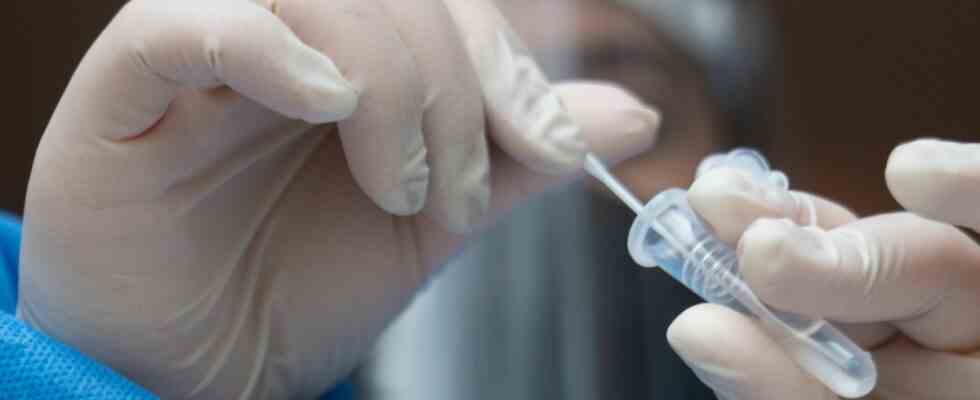The Robert Koch Institute (RKI) has lowered its risk assessment of the current corona situation in Germany by one level. The authority now assesses the current risk of Covid-19 for the health of the population as “high” overall, as stated in the RKI weekly report published on Thursday evening. The risk had previously been rated as “very high”.
The experts justify the assessment with the recent clear decline in infection rates, but still considerable infection pressure. In the past week, the seven-day incidence has fallen further compared to the previous one – by 19 percent. The number of people treated in an intensive care unit with a Covid 19 diagnosis has recently fallen further and the number of deaths has also decreased.
Nevertheless, with almost 600,000 corona cases transmitted to the RKI within the last week, the number of infections is still high. Vaccination remains correspondingly important. As before, “due to its high protective effect against a severe course, even in diseases caused by the omicron variant, it has not lost its importance,” says the report.
RKI reported 85,073 new infections within 24 hours on Friday. That is 16,537 fewer cases than on Friday last week, when 101,610 corona infections were reported. The nationwide seven-day incidence drops to 553.2 from 566.8 the previous day. 214 other people died in connection with the virus. This increases the number of reported deaths to 136,339.
The number of infections is currently only of limited significance. Experts have been assuming for some time that there will be a large number of cases not recorded by the RKI – due to overworked health authorities and because not all infected people have a PCR test done. Only these count in the statistics. That is why we use the SZ Corona Dashboard to show an average value from the reports of the past seven days, which is intended to compensate for fluctuations from day to day. You can find more information on this in the transparency blog, further data and graphics on the pandemic here. (06.04.2022)
EMA expects Omicron vaccines to be approved by September
According to the European Medicines Agency (EMA), vaccines against the highly contagious omicron variant of the coronvirus could be approved by the end of September at the latest. The greatest opportunities are for appropriately adapted mRNA vaccines from the companies Moderna and Biontech, said EMA Director for Vaccination Strategy Marco Cavaleri at a press conference by the authority in Amsterdam.
The necessary clinical studies are in progress. The EMA also examines preparations from other manufacturers. However, it is “no secret” that the adaptations of mRNA vaccines from Moderna and Biontech to Omikron are already quite advanced. He did not give details of the study data collected so far.
At the same time, Cavaleri appealed to unvaccinated people to protect themselves against corona with vaccinations before autumn/winter. “The top priority must be closing the vaccination gap.” Only 50 percent of Europeans have been fully vaccinated and boosted so far, while 15 percent of European residents over the age of 18 have not yet received a single vaccination against Covid-19. (05/05/2022)
WHO: A good 15 million deaths in connection with Corona
According to estimates by the World Health Organization (WHO), the corona pandemic has claimed the lives of around 14.9 million people. According to this, between January 1, 2020 and December 31, 2021 there were 13.3 to 16.6 million more deaths worldwide than would be expected based on statistics from previous years. WHO Director-General Tedros Ghebreyesus spoke in Geneva of “sobering data”. These not only underscored the impact of the pandemic, but also the need for all countries to invest more in resilient health systems. (05/05/2022)
WHO boss calls on pharmaceutical companies to cut prices and accuses them of “moral failure”.
The head of the World Health Organization has asked pharmaceutical companies to lower their prices for Covid 19 drugs. While the companies are making record profits, they charge prices for these drugs that poor countries cannot afford, criticized Tedros Adhanom Ghebreyesus in Geneva. He spoke of moral failure. Tedros did not name any company.
Because of the scarce supply and high prices, some countries could not buy the life-saving drugs. “It is unacceptable that in the worst pandemic in a century, novel treatments that can save lives are not reaching all who need them,” Tedros said. The WHO accepts that innovation in pharmaceutical companies must be rewarded. “But we cannot accept prices that make life-saving Covid-19 medicines only accessible to the rich and out of the reach of the poor. That is moral failure,” Tedros said.
In April, after several other remedies, the WHO recommended the drug Paxlovid from the US company Pfizer, which is also already being used in Germany, for certain corona patients. The funds can protect against severe disease progression in the early phase of a Sars-CoV-2 infection. Pharmaceutical companies typically offer drugs in three price categories, so low-income countries pay significantly less for them than rich countries. As with the first corona vaccines last year, however, many rich countries have secured a large part of the first production of the Covid 19 drugs with orders, so that initially little was left. (05/05/2022)

